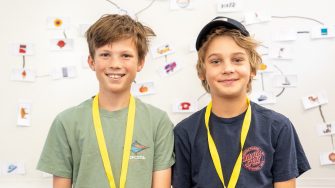
Expand your mind in a fun & challenging environment
A Message from the Director – Professor Jae Jung
For more than 30 years, GERRIC’s Student Programs have supported gifted students from across Australia and around the world.
Designed for students in Years 3–10, our programs provide the intellectual challenge and stimulation that many gifted students don’t always experience in school. They also offer a rare chance to connect with like-minded peers who share similar interests and abilities.
Over the years, students have explored a wide range of exciting topics, including:
Brain sciences
Virtual reality
Mythical fantasy
Cosmology
Machine learning
Wired writing
Cinematic sounds
Psychology
Cryptology
We’ve also introduced new initiatives such as parent information sessions and tours of UNSW’s cutting-edge laboratories – including the High Voltage Lab, Fibre Fabrication Lab, and Anechoic Chambers.
Many past participants return to GERRIC as volunteers, presenters, and role models. In 2024, one alumnus – now with a PhD in astrophysics from UNSW – returned to speak at our parent session. Personally, I began my own journey with GERRIC as a student volunteer in 2005.
— Professor Jae Jung, Director of GERRIC
What Is the Program?
GERRIC’s Student Programs run during school holidays and are designed for bright, curious students who want more challenge – and more fun – than they may find in the classroom.
At UNSW, gifted students:
Discover abilities they may not have realised they have
Learn from passionate educators with expertise in their fields
Connect and socialise with other gifted students who share their interests
Who Can Apply?
The programs are open to gifted, talented, and twice-exceptional students in Years 3–10 who are performing in the top 10% of their age group.
For full details, please see our Academic Entry Criteria.
Subscribe to our newsletter to stay updated as topics and further details are released.
When Is the Next Program?
We’re excited to announce the return of our Student Programs in January 2026.
- Curious about 2026 programs? Please see 2026 Programs to know more about the programs offered for 2026.
- Scholarships – Further information on scholarships and applications can be found here.
- Preparing to enrol your child in the Student Programs? Please click here to know more about the process.
Key Dates
12 September 2025 – Program launch + Scholarship & Rural Access Applications open
29 September 2025 – General ticket sales open
21 November 2025 – Final ticket confirmations + parent handbook released
14–16 January 2026 – Junior Program (Years 3–6) at UNSW Kensington
20–22 January 2026 – Senior Program (Years 7–10) at UNSW Kensington
Testimonials
-
I really liked how the learning was paired with games and fun activities so it made learning more interactive and allowed me to easily make new friends.
-
I had a wonderful time during the 3 days of the programs, getting to socialise with peers and expand my ways of thinking. The class was very engaging and a great learning experience. I have obtained many new skills and would definitely take part in this program again.
-
My son absolutely loved the GERRIC Student Programs. Although it pushed him outside of his comfort zone, the teacher provided excellent guidance, helping him to embrace the challenge. [...] The experience really helped him grow, and he came away feeling more confident and capable.
Learn about what GERRIC can offer your student
All workshops are developed and presented by experienced teachers who are qualified or experienced in gifted education. They possess the expertise and skills to encourage the interests and pique the curiosity of gifted children. Workshops in Years 7-10 are developed and led by practising experts, the workshops follow a university-style investigative structure with intellectually-stimulating content.
To provide an appropriate level of rigour and challenge for gifted students, the level of difficulty of the workshops is set two years above the enrolled school level of the child. The workshop structure is also designed to further develop social skills and provide an opportunity for gifted students to meet like-minded peers with similar interests.
Watch highlights from January's Student Programs
Hear directly from students, parents, workshop presenters, and our GERRIC student leader volunteers as they reflect on their experiences and the significance of these programs.
Click below to watch the video!
